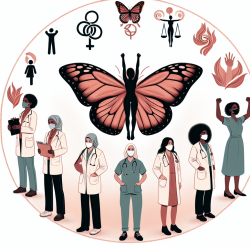In the realm of public health and education, the concepts of gender justice and empowerment are pivotal. The research article titled "Gender, Justice and Empowerment: Creating the World We Want to See" provides a comprehensive exploration of these themes. This blog post aims to guide practitioners in enhancing their skills by implementing the outcomes of this research or encouraging further exploration.
The Importance of Gender Justice and Empowerment
Gender is a critical social determinant of health. Power imbalances due to gender and sexual orientation lead to negative health outcomes and risk exposures for individuals across the gender spectrum. These include exposure to violence, inability to negotiate safer sex, diminished reproductive choices, and decreased access to economic, political, and social capital. Over the past 25 years, women's empowerment has been recognized as a strategy to address these issues across various fields.
The COVID-19 pandemic has exacerbated these challenges, disproportionately affecting women due to increased childcare demands and impacts on female-dominated service industries. Intimate partner violence (IPV) is also likely to spike due to social isolation. Therefore, focusing on justice and empowerment for women and marginalized groups is essential in public health.
From Women's Empowerment to Gender Transformation
The shift from 'women's empowerment' to 'gender transformation' involves recognizing that men and boys must be allies in creating a more equitable world. Toxic masculinities harm not only women but also men and boys. Individual-level programs alone cannot address gender inequality; broader social structures must be navigated.
This shift has led to an increase in scholarly publications on women's empowerment and gender transformation. However, terminology remains debated—are we changing social norms or addressing broader systems of privilege and oppression?
Implementing Research Outcomes
Practitioners can enhance their skills by integrating strategies from the research into their work:
- Engage Men as Allies: Encourage male participation in gender equity initiatives. Programs should involve men in discussions about gender norms and empower them to challenge toxic masculinities.
- Adopt Intersectional Approaches: Recognize how gender intersects with other identities like race, class, and sexuality. Tailor interventions to address these intersections.
- Focus on Structural Changes: Move beyond individual empowerment to advocate for policy changes that address systemic inequalities.
- Utilize Mixed Methods: Combine qualitative insights with quantitative evidence to evaluate program effectiveness comprehensively.
Encouraging Further Research
Practitioners are encouraged to delve deeper into the nuances of gender justice and empowerment:
- Pursue Interdisciplinary Research: Collaborate across fields such as sociology, economics, and political science to gain a holistic understanding of gender issues.
- Explore Community-Based Approaches: Engage with communities to design interventions that resonate with local contexts and address specific needs.
- Advocate for Policy-Level Changes: Work towards legislative reforms that promote gender equality at national and international levels.
The journey towards gender justice is ongoing. By incorporating these strategies into practice, practitioners can contribute significantly to creating a more equitable world.
To read the original research paper, please follow this link: Gender, justice and empowerment: creating the world we want to see.










